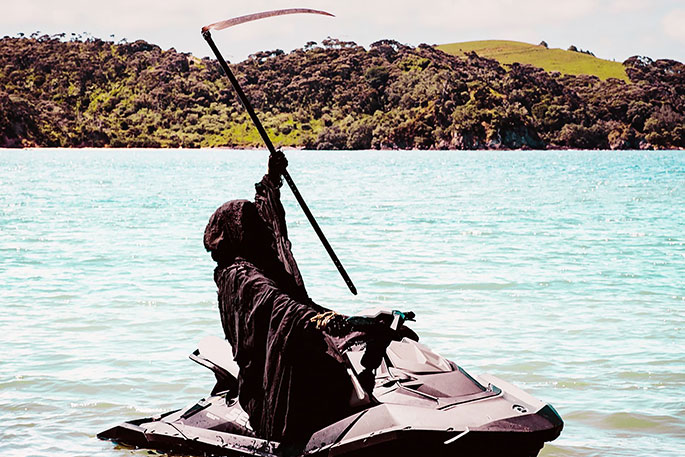A new water safety campaign is making people think twice about their attitudes and behaviour around water.
New research by Water Safety New Zealand shows the Swim Reaper campaign has had a significant impact.
It's designed to target young males aged 15 to 34 who make up a third of New Zealand's annual drowning toll.
Since its launch in the summer of 2016/17 the campaign has been a great success with 350,000 followers on instagram and multiple awards for social media effectiveness.
The campaign's objective is simple; stop young males making unwise decisions and engaging in risky behaviour around water.
WSNZ's third annual public attitudes and behaviour survey shows a significant decrease in people getting into trouble in the water due to alcohol, showing off or peer group pressure.
|
|
2018 |
2017 |
2016 |
|
Showing off |
9% |
14% |
10% |
|
Alcohol |
6% |
11% |
7% |
|
Peer group pressure |
5% |
10% |
8% |
These are exactly the types of behaviour the Swim Reaper was designed to reduce.
'This is very pleasing,” says WSNZ CEO Jonty Mills.
'The Swim Reaper has been an incredible success in terms of reaching a young audience and we hope the end result will be behaviour change and better appreciation of the importance of water safety.”
The survey also reveals people are increasingly aware of the safety precautions they need to undertake to stay out of trouble in the water:
• 50 per cent of respondents who went swimming at a patrolled beach always swim between the flags (up 10 per cent since 2016)
• 30 per cent of respondents always check the weather report before swimming at an unpatrolled beach (up 10 per cent since 2016)
• 39 per cent of respondents who went surfing, boogie boarding, or wind surfing at least sometimes wear a lifejacket (an increase of 16 per cent since 2016)
• People going surfing boogie boarding or windsurfing are also less likely to go out by themselves. Over 50 per cent of respondents would go out by themselves in 2016 compared with only 38 per cent in 2018.
In addition 35 per cent of respondents stated they experienced a serious situation in the water.

When asked what they thought were the main factors that caused the problem, underestimating the conditions and lack of knowledge about the environment ranked highest.
'This reflects what we see happening in preventable drowning incidents, underestimating the risk and overestimating ability.
'The Swim Reaper campaign is about showing what could happen if you engage in risky behaviour around water. This research is encouraging in that it shows the message appears to be getting through.”



0 comments
Leave a Comment
You must be logged in to make a comment.